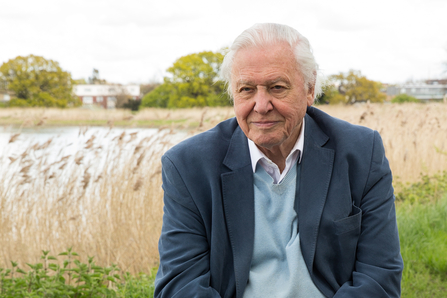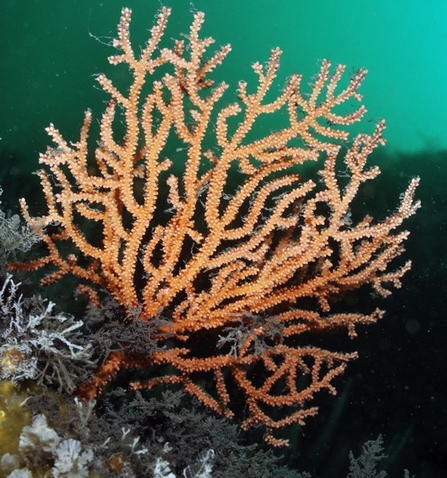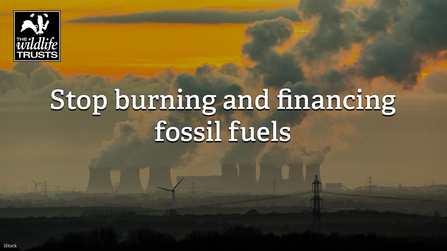Autumn can be the loveliest of seasons. In a bad year the leaves and grasses that have worked so hard over the summer seem to give up hope and decay forlornly to a dull brown before withering and dropping unnoticed and unloved onto the muddy ground below. But in a good one we’re treated to a crescendo of colour, every tree exaggerating its presence, becoming a more strident red, a brighter yellow, a richer brown, a more shocking gold, a final explosion of effort to celebrate all that’s been accomplished in a tremendous year of growth. If we’re lucky, the colours can hang precipitously for a few days, like a massive wave reared up and ready to topple, before the autumn winds rip everything away, leaving a skeletal landscape and the grim realisation of four dark, grey months before spring.
COP26: What did we learn and what do we do now?
© Lauren Heather

COP26 is over, along with the sparkle, vibrancy and colours of every hue. We all know It didn’t live up to its expectations. Despite the protests, the hype, the warnings from top scientists, the inspiring interviews and statements from Sir David Attenborough and Barak Obama, world leaders didn’t step up. Her Majesty the Queen put it very well in her opening statement – when leaders act in response to the concerns of today, that’s government and politics, but when they act with regard to their children, that’s statesmanship. Depressingly, politics seemed to have trumped statesmanship for the most part.
But there were good things to report too. The commitment to end deforestation by 2030 may sound like a damp squib but over 100 countries signed up to it, crucially Brazil. 46 countries have agreed to phase out coal – nowhere near enough and missing China and the USA – but that’s still 46 more than five years ago. There are important commitments to slashing methane, and nature’s role in tackling climate change received far more attention in the debate this time round. Baby steps yes, but steps nonetheless.
And this time the nature of the crisis we face was brought to life by some amazing personalities. Elizabeth Wathuti, the Kenyan activist who described with such emotional clarity how climate change is affecting her community. Ruben Reuter the young presenter with additional needs, who was brave enough to interview some of the most powerful figures at the conference. And indigenous communities, all too often shut out of discussions, had a much louder voice and more visible presence, albeit not quite enough to reach the eyes and ears of some political leaders.

Linda Pitkin/2020VISION
Local solutions are popping up everywhere too. Some of the most inspiring of these came to light through the Earthshot prize. Coral Vita, which grows coral on land, and at 50 times the speed of traditional methods, to replant in oceans and revive dying reefs. Enapter, whose AEM Electrolyser technology turns renewable electricity into emission-free hydrogen gas that is already being used to fuels cars, power industry and heat homes. And Costa Rica’s inspired plan to bring nature back to its cities.
Like Covid, the climate crisis is also highlighting inequalities. Women, indigenous communities, disabled and children are most likely to feel the impacts. Just getting a place on the negotiating table is hard for many groups. Some campaigners, like the wonderfully charismatic Vanessa Nakate from Uganda, have seen their pictures cropped out of photographs by certain news outlets. And perhaps the biggest inequality of all was the yawning gulf between the community representatives and activists in all their colour and passion who occupied the external space, and the politicians, diplomats and professional lobbyists in their grey suits and black limousines, who occupied the inner one. Patience Nabukalu of Ugandan Fridays for the Future put it very starkly – it’s us who are experiencing the impacts of climate change, not world leaders.
Let’s face it, governments of the world’s richest nations rarely have been leaders when it comes to thinking for the long term health of our planet. That’s a job that appears more than ever to be down to determined communities and inspired individuals. It was people power that brought about the Environment Act. It was people power that led to the UK government declaring a climate emergency. And it will ultimately be people power, here in the UK and abroad, that brings about the green revolution our economy so desperately needs.

So what must we do now? Let’s start with our own house. We can hold our government’s feet to the fire about fossil fuels. Public outcry forced a U-turn on sewage in rivers, and we can do the same for new coal mines and shocking proposals to open new oil fields in the North Sea. We must force them to rethink their massive expenditure on roads, which dwarf anything promised for the natural environment or progressive farming. We must make sure they protect peatlands and marine habitats, and that the new planning system acts for nature and the climate rather than against it. And we must make sure they stand by their commitments to provide finance to help developing countries transform to a greener future.
To do this, we need to build on the numbers of people supporting the cause and prepared to take action. That’s why DWT is investing heavily in its work with communities and giving this so much weight in our new strategy. We need at least a quarter of people across Devon, and the whole UK, to be taking action for the natural world. There’s good evidence from social science that once you reach this level, you can tip the scales.
The temptation now the COP26 moment has passed is to shake our heads sadly and go back to thinking about other things, or worse, to becoming cynical about our ability to bring about real change. That’s just what some would like to see, and we need to disappoint them. World leaders will be back again next year to discuss climate change again. We need to redouble our efforts. It’s never too late, and our work is never done. We must keep fighting.

